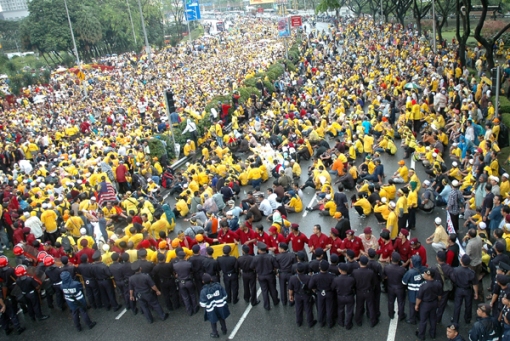Bersih rally provides lessons to Malaysian gov’t

By Jia Ning Tan, Xinhua News
KUALA LUMPUR, July 12 (Xinhua) — Last weekend’s rally in Malaysia posed a question to the government: should it look into the electoral system or are there lessons to be learned?
On Saturday, floods of activists of the Coalition for Clean and Fair Elections or Bersih joined an illegal street demonstration in Kuala Lumpur, demanding for an electoral reform.
The authorities put the figure of demonstrators at five to six- thousand people.
The situation returned to normal at 6 p.m. on the day and a total of 1,667 demonstrators were arrested, including the organizers of the rally but were released by Sunday.
Meanwhile, thousands of activists living abroad also gathered in about 30 different cities around the world demonstrating for the same cause, making the rally the largest one over the past four years.
Prime Minister Najib Razak repeatedly denied any shortcomings in the country’s electoral system in Malaysia.
He noted earlier that if the government could manipulate electoral results, then the ruling coalition Barisan Nasional ( Malay for National Front) would not have lost five states in 2008 General Election, would not lose the two-thirds majority in parliament and PAS (the opposition) would not have been administering Kelantan for the past 21 years.
“We even display the electoral list for voters to check,” he added.
Former Prime Minister Mahathir Mohammad echoed his view, condemning the rally as politically-motivated.
“Its objective is to tarnish the government’s name and the police, so that the opposition will win,” Mahathir said earlier this month.
MOTIVATION BEHIND, LESSONS EMBEDDED
Analysts also said the rally was more than just about electoral reform.
“You have the non-governmental organizations wanting the electoral reform, that was the principle reason; but all kinds of other groups also flocked into the bandwagon partly because they see that as a platform for them to surface their issues,” Ibrahim Suffian, a political analyst from opinion research firm Merdeka Center told Xinhua in an exclusive interview.
“You see the opposition parties and their supporting the Bersih rally partly because they see this as a platform on which they can show strength and energize their leadership,” he said.
“They see this as a platform they can raise the issues that they were critical of the government in recent times, like corruption, slowness in implementing policies,” he added.
He said although the government was not likely to bow to their demands considering how near the general election looms, Bersih succeeded in placing pressure on the government, triggering awareness about electoral reform among the people and mobilize the Malaysians living abroad.
“They have placed some form of pressure in the government, they were able to mobilize Malaysians outside of Malaysia and I think for people who care about this issue, they can see the difference of treatment for demonstrators in overseas,” Ibrahim said.
And he expects the rally to better prep the government in handling dissent, which was under scrutiny recently after the rally.
Police were claimed by the demonstrators and activists to be using excessive force when making arrests and dispersing the crowd in the rally an accusation the government said it was investigating.
“In Malaysia, there are groups of people who are equally patriotic, equally responsible but may not agree with certain policies,” he said.
“I noticed a large number of young people who were there for the first time. The key lesson here is how the government can engage this segment society, who are not necessarily anti- government but they have different views, they need to be engaged, ” he added, suggesting that the government would in the end find a middle ground between the people’s grievances and what it can deliver to portray itself positively.
Although it would likely embolden the opposition for now, giving them a sense of power, Ibrahim said it also allows the government to widen its focus, from a series of people-friendly policies and transformation programs to core issues that concern the younger generation, like rights and democracy.
“The government needs to be transparent, acknowledge the flaws in the system, they need to begin to talk to these people,” he added.
Bersih, a non-government organization, was advocating for a clean and fair election in the next general election, which is expected to start within this year. They have eight demands, which include introducing automatic voter registration, reforms to postal voting and the use of indelible ink.
The organization held a similar rally with a crowd of an estimated between 10,000 to 40,000 people in 2007 that dealt a major blow to the ruling coalition, who lost five states to the opposition during the 2008 election.

